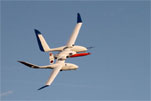The Eole demonstrator started flight testing in October, marking a major step forward in the development of this automated reusable aircraft that could be used for nanosatellite launches.
Eole is mainly financed by CNES, and is being co-developed by French aerospace research center Onera as prime contractor and the company Aviation Design. This experimental aircraft is being used to study the feasibility of replacing the first stage of a conventional launch vehicle by an automated, reusable launch aircraft. The aim of this program is to prove the technological validity of this innovative launch concept, designed to orbit nanosatellites (from 10 to 50 kg) quickly and at moderate cost.
 Today, these nanosatellites are launched as "auxiliary passengers" along with larger satellites on conventional launch vehicles. Onera developed the Eole concept of a scale demonstrator to study the feasibility of a dedicated launch solution for nanosatellites.
Today, these nanosatellites are launched as "auxiliary passengers" along with larger satellites on conventional launch vehicles. Onera developed the Eole concept of a scale demonstrator to study the feasibility of a dedicated launch solution for nanosatellites.
Eole is a ¼ scale, remotely-operated experimental aircraft, 6.7 meters (22 ft) long, that represents a future air launch system. Four flights have already been carried out at the Saint-Yan airfield in Burgundy, each lasting about 20 minutes, at low speed, and with or without an experimental rocket payload. These flights confirmed the good performance of Eole. This critical stage in the program is the culmination of four years of research on the air launch concept (2005-2009), followed by four more years to develop the Eole demonstrator (2009-2013). Further test flights of Eole will be conducted in 2014 to check its performance over the entire flight envelope, as well as the flight control/guidance systems required for automated flights. These test flight will culminate in the release of an experimental rocket.
The development of Eole is a joint effort by the Launcher Directorate of CNES, Onera and Aviation Design. It is mainly funded by CNES, with a contribution from Onera. Eole is also being developed within the scope of Perseus, a CNES-led European space research project that associates students and researchers from universities and aeronautical engineering schools with the two main developers, Onera and Aviation Design. Participating schools include the Ecole d’Ingénieurs de l’Air et l’Espace (IPSA), Université d'Evry Val d'Essonne (UEVE), Institut Supérieur de l’Aéronautique et de l’Espace (ISAE) and Ecole Nationale Supérieure d'Arts et Métiers ParisTech (ENSAM). IPSA designed the experimental rocket, UEVE the payload adapter and release device, and ISAE carried out the wing deflection tests.
Onera is the project prime contractor and lead developer. In particular, it defined the aerodynamics for Eole and its structure, checked aeroelastic stability and determined flight performance. It also developed the flight control/guidance laws and analyzed potential failure points to determine flight safety procedures.
Aviation Design, a small French company specialized in flight demonstrators, handled the overall and mechanical design of the demonstrator, and built the aircraft itself and all of its systems, as well as the ground support equipment, integrated the aircraft and carried out associated tests. Along with Onera, Aviation Design is now in charge of the upcoming flight tests.
CNES validated all of these developments and is responsible for the required safety arrangements at the test sites.
In 2012, the three partners received a joint patent in France for Eole.




